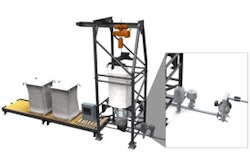CHARLESTON, W.Va. (AP) — The superintendent of the West Virginia coal mine where an explosion killed 29 men was charged Wednesday with conspiracy to defraud the federal government, becoming the highest-ranking Massey Energy employee to face criminal prosecution so far over the deadly blast.
Former Upper Big Branch mine boss Gary May, 43, of Bloomingrose, W.Va., is named in a federal information, a document that signals a defendant is cooperating with prosecutors. He is the second Massey employee to face prosecution in the case.
Reached at his home Wednesday morning, May declined comment.
U.S. Attorney Booth Goodwin said his investigation of the worst U.S. mine disaster in four decades is "absolutely not" finished but did not immediately comment further.
Although other mine disasters have led to criminal charges, they've typically targeted low-ranking employees and have largely been misdemeanor offenses. A conviction on the federal fraud charge could result in fines and up to five years in prison. It's a rare, if not unprecedented legal strategy that appears to be moving up the corporate ladder.
"I hope they can go up, and I think they will," said Gary Quarles, whose son Gary Wayne died in the explosion. Quarles said he's surprised the charge reached so high into the ranks.
"Usually, they get the mine foreman because that's the person that signs the books," he said. Superintendents typically don't and are therefore shielded.
But Quarles said the charges suggest prosecutors are looking at May's bosses, too.
"It's about time," he said. "It's a good start."
Last week, Goodwin urged a federal judge in Beckley to make an example of the only other person charged so far, former security chief Hughie Elbert Stover. Goodwin is demanding the maximum possible sentence of 25 years in prison for actions he says contributed to the April 2010 disaster near Montcoal.
Stover is to be sentenced Feb. 29 for lying to federal investigators and attempting to destroy documents.
May began working at Upper Big Branch in February 2008 as a mine foreman and was promoted in October 2009 to superintendent. He held that post, overseeing three room-and-pillar mining sections and a longwall operation, until the day the mine exploded on April 5, 2010.
The information filed in U.S. District Court in Beckley accuses May of conspiring with others to conceal many dangers in the mine through an elaborate scheme that included code words to alert miners underground when inspectors were on the property, the deliberate alteration of approved ventilation plans and the deliberate disabling of a methane gas monitor on the continuous mining machine.
May allegedly ordered the wiring to be altered in February 2010 so the automatic shut-off mechanism was disabled, allowing the machine to function for several hours without a methane monitor.
Other employees of the mine have told investigators there was never enough fresh air to sweep out the highly explosive methane and coal dust that regularly accumulated — the fuel that three separate investigations have concluded powered the chain-reaction blast.
The information also says that when May knew the Mine Safety and Health Administration was about to sample the level of respirable coal dust in a section of the mine, he surreptitiously redirected additional air to that area to obscure the typical conditions.
May is also accused of both falsifying safety inspection books and ordering someone not named in the information to leave out reports of deep water that would have made a section of the mine unsafe.
Clay Mullins worked at Upper Big Branch and lost his brother Rex in the blast, but didn't cross paths with May.
"It's what we wanted. All the families, it's what they want," he said of the charges. "But I want to see some other names. ... There was a lot of people involved in this, and I just want to see them be punished for the crimes.
"If they're innocent, then I want them to be found innocent," Mullins said. "But if they're guilty, I want them to face the maximum penalty of law."
The information says Massey subsidiary Performance Coal Co. and its managers routinely violated a host of federal mine safety laws for fear that violations would cut into production time.
Had MSHA detected the concealed conditions, it would have resulted in temporary shutdowns and fines. That also could have moved Massey closer to being designated a pattern violator, which would have subjected it to even more scrutiny.
Reports about the explosion have already been released by MSHA, the United Mine Workers of America and an independent panel appointed by the former governor. The fourth and final report, by the state Office of Miners' Health Safety and Training, is being released Thursday.
The first three concluded that Virginia-based Massey Energy — which has since been bought by Alpha Natural Resources — allowed methane and coal dust to accumulate, and failed to properly maintain and repair the cutting equipment that eventually created the spark that fuel needed to explode.
Clogged and broken water sprayers then allowed what could have been a minor flare-up to become an epic blast that traveled seven miles of underground corridors, doubling back on itself and killing men instantly.
All three reports said the explosion could have been prevented or contained if the mine had been sufficiently dusted with pulverized limestone to render the coal dust inert. In the year before the Upper Big Branch blast, 70 ignitions occurred at U.S. coal mines, and none resulted in fatalities.
The UMWA report accused Massey of "industrial homicide" for the way it ran Upper Big Branch and listed 18 employees, including former Chief Executive Officer Don Blankenship, who invoked their right to avoid self-incrimination and refused to cooperate with investigators.
May is one of the 18 that the UMWA says should be compelled to publicly plead their Fifth Amendment rights or be held in contempt of court.






















